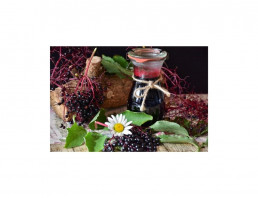Collagen
What is Collagen?
Collagen is a protein that binds tissue and is one of the main building blocks of the skin. It makes up around 75% of the dry weight in our skin. Collagen is made up of 3 amino acids: glycine, proline and hydroxyproline. Together these amino acids provide the skin with volume, giving it a plum look and feel and help wrinkles or lines stay away.
There are 28 types of collagen with three types that are most abundant in the body.
Type I: This is the main type of collagen and accounts for roughly 90% of the body’s collagen. It is made of densely packed fibers and is found in the skin, bones, tendons, fibrous cartilage, connective tissue and teeth.
Type II: This type is made of more loosely packed fibers and is found in the elastic cartilage, which cushions joints, and in the eyes.
Type III: This type supports the structure of muscles and blood vessels and is also found in the skin.
How is collagen made?
Collagen starts off as procollagen. Procollagen, a precursor, is a combination of two amino acids, glycine and proline. The process then involves steps to convert procollagen to collagen, which requires vitamin C. Therefore, if the body is deficient in vitamin C collagen cannot be produced with the risk of scurvy developing. Other amino acids involved hydroxyproline, glutamine, and arginine. In addition, minerals that support collagen production are manganese, copper and zinc.
What source of collagen should I use?
The sources of supplemental collagen depend on the type of collagen. If the source is beef or bovine, this supplies type I and III. If the source is chicken collagen this supplies type II. Fish collagen is type I and eggshell membrane is mostly type I and some type III and IV.
Type I and II collagen have specific benefits for the skin whereas is type III is best for cartilage. Small amounts of bovine collagen, type I and III, haven been used in the treatment of rheumatoid arthritis.
Look for hydrolyzed collagen. When a product is hydrolyzed collagen, that means the collagen is processed to smaller collagen molecules and the small intestine can efficiently absorb the collagen.
Collagen is animal source, how about if I am vegan?
Collagen must be from some type of animal or fish source. However, there are products that contain supplemental amino acids, vitamins and minerals that help the body make collagen molecules.
What about vitamin C?
One study found that vitamin C supplements can boost the production of type I and type III collagens. Vitamin C also induces the production of enzymes that encourage your body’s own natural collagen development. Without vitamin C your body cannot convert amino acids into the strands that form collagen fibrils.
What are additional ways to supplement or help delay the loss of collagen?
1. Use topicals to enhance collagen production to help replenish collagen stores. Retinoids or retinols: stimulate collagen synthesis in the skin. Alpha hydroxy acids, like glycolic acid, and peptides trigger collagen formation
2. In-office treatments performed by dermatologists: lasers, radiofrequency, ultrasound, micro-needling, fillers
Micro-needling: is a skin procedure that uses tiny needles that prick small holes in the top layer of skin. It is thought to disrupt the collagen and stimulates the body to form new, more youthful collagen fibers.
3. Protein-rich foods
4. Nutrients: vitamin C, zinc, copper
5. Wear broad-spectrum sunscreen with at least SPF 30
6. Regular skin massage: helps encourage the formation of procollagen-1 and enhance the benefits of anti-aging creams
Elderberry (Sambucus Nigra)
Sambucus nigra, Elderberry
Elderberry, also known as Sambucus nigra, is great for colds and may help invoke sweating and diuresis. It helps induce sweat and relieves joint and muscle pain during fevers. There are small studies to support antiviral properties, immune modulation and antioxidant properties.
Studies involving patients with influenza have shown a reduction in symptoms when taking Elderberry. The studies reported Elderberry shortens the duration of flu symptoms such as fever, fatigue, headache, sore throat, cough and body aches. These studies concluded that further larger studies are needed to confirm the results.
In addition, in vitro studies (not humans) have proven Elderberry to be effective against numerous strains of influenza. It is thought that the constituents help neutralize the activity of the hemagglutin. Hemagglutin is found on the surface of the virus and by neutralizing the activity of hemagglutin the virus becomes inactive and is unable to infect cells.
Elderberry can be used during active flu (optimally combined with Oregano Oil or Echinacea Goldenseal), or used as a preventative to avoid getting sick during the flu season.
Elderberry has a high concentration of anthocyanins. These are purple pigments (also what gives Elderberry its color) serve as antioxidants and enhance immune function (by immune modulation) stimulating the innate immune system and boosting the production of cytokines. Cytokines are proteins that regulate the immune response. Elderberry is also rich in flavonoids, quercetin (thought to be a natural antihistamine) and vitamin A and C. It can be taken daily to help strengthen a person’s immune system. Stronger immune systems have a better chance of fighting infections.
Elderberry may also offer cardiovascular protection. This is thought to be due to its oxidative properties and reducing the oxidation of LDL cholesterol. LDL is bad cholesterol and is a risk factor for cardiovascular disease. By helping to reduce LDL it may benefit people with high cholesterol. In addition, it has the ability to potentially improve endothelial cells to help with vascular function. Studies have been very small and larger studies are needed to warrant the effect on LDL and the cardiovascular system.
At Rancho Pharmacy we carry Elderberry, both for adults and kids! Stop by today to get your bottle of Elderberry!
References:
1. V. Barak, T. Halperin, I. Kalickman. The effect of Sambucol, a black elderberry-based natural product, on the production of human cytokines: I. Inflammatory cytokines. European Cytokine Network. 2001;12(2):290-6 https://www.ncbi.nlm.nih.gov/pubmed/11399518Accessed on March 23, 2020
2. http://www.altmedrev.com/archive/publications/10/1/51.pdf. Accessed on March 23, 2020
3. Zakay-Rones Z, Varsano N, Zlotnik M, et al. Inhibition of several strains of influenza virus in vitro and reduction of symptoms by an elderberry extract (Sambucus nigra L.) during an outbreak of influenza B Panama. J Altern Complement Med. 1995;1(4):361–369. doi:10 Access on March 23, 2020

